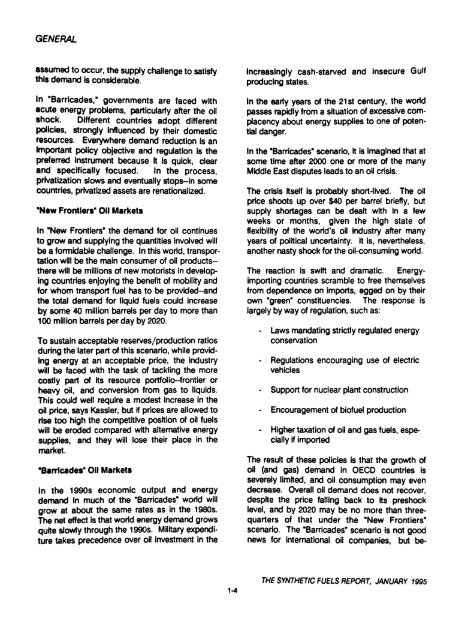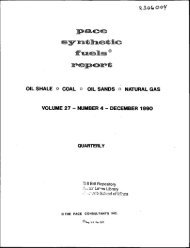Ikelic - Alliance Digital Repository
Ikelic - Alliance Digital Repository
Ikelic - Alliance Digital Repository
Create successful ePaper yourself
Turn your PDF publications into a flip-book with our unique Google optimized e-Paper software.
GENERAL<br />
assumed to occur, the supply challenge to satisfy<br />
this demand is considerable.<br />
In "Barricades,"<br />
governments are faced with<br />
acute energy problems, particularly after the oil<br />
shock. Different countries adopt different<br />
policies, strongly influenced by their domestic<br />
resources. Everywhere demand reduction is an<br />
important policy objective and regulation is the<br />
preferred instrument because it is quick, clear<br />
and specifically focused. In the process,<br />
privatization slows and eventually stops-in some<br />
countries, privatized assets are renationalized.<br />
"New Frontiers"<br />
In "New Frontiers"<br />
Oil Markets<br />
the demand for oil continues<br />
to grow and supplying the quantities involved will<br />
be a formidable challenge. In this world, transpor<br />
tation will be the main consumer of oil products-<br />
there will be millions of new motorists in develop<br />
ing countries enjoying the benefit of mobility and<br />
for whom transport fuel has to be provided-and<br />
the total demand for liquid fuels could increase<br />
by some 40 million barrels per day to more than<br />
100 million barrels per day by 2020.<br />
To sustain acceptable reserves/production ratios<br />
during the later part of this scenario, while provid<br />
ing energy at an acceptable price, the industry<br />
will be faced with the task of tackling the more<br />
costly<br />
part of its resource portfolio-frontier or<br />
heavy oil, and conversion from gas to liquids.<br />
This could well require a modest increase in the<br />
oil price, says Kassler, but if prices are allowed to<br />
rise too high the competitive position of oil fuels<br />
will be eroded compared with alternative energy<br />
supplies, and they will lose their place in the<br />
market.<br />
"Barricades"<br />
Oil Markets<br />
In the 1990s economic output and energy<br />
demand in much of the "Barricades"<br />
world will<br />
grow at about the same rates as in the 1980s.<br />
The net effect is that world energy demand grows<br />
quite slowly through the 1990s. Military expendi<br />
ture takes precedence over oil investment in the<br />
1-4<br />
increasingly cash-starved and insecure Gulf<br />
producing states.<br />
In the early years of the 21 st century, the world<br />
passes rapidly from a situation of excessive com<br />
placency about energy supplies to one of poten<br />
tial danger.<br />
In the "Barricades"<br />
scenario, it is imagined that at<br />
some time after 2000 one or more of the many<br />
Middle East disputes leads to an oil crisis.<br />
The crisis itself is probably short-lived. The oil<br />
price shoots up over $40 per barrel briefly, but<br />
supply<br />
shortages can be dealt with in a few<br />
weeks or months, given the high state of<br />
flexibility of the world's oil industry after many<br />
years of political uncertainty. It is, nevertheless,<br />
another nasty shock for the oil-consuming world.<br />
The reaction is swift and dramatic.<br />
importingc<br />
Energy-<br />
countries scramble to free themselves<br />
from dependence on imports, egged on by their<br />
own "green"<br />
constituencies. The response is<br />
largely by way of regulation, such as:<br />
- Laws<br />
- Regulations<br />
- Support<br />
- Encouragement<br />
- Higher<br />
mandating strictly regulated energy<br />
conservation<br />
encouraging<br />
vehicles<br />
use of electric<br />
for nuclear plant construction<br />
of biofuel production<br />
taxation of oil and gas fuels, espe<br />
cially if imported<br />
The result of these policies is that the growth of<br />
oil (and gas) demand in OECD countries is<br />
severely limited, and oil consumption may even<br />
decrease. Overall oil demand does not recover,<br />
despite the price falling back to its preshock<br />
level, and by 2020 may be no more than three-<br />
quarters of that under the "New Frontiers"<br />
scenario. The "Barricades"<br />
scenario is not good<br />
news for international oil companies, but be-<br />
THE SYNTHETIC FUELS REPORT, JANUARY 1995















![pace SrntfletIc fne]its report - Alliance Digital Repository](https://img.yumpu.com/10493335/1/190x245/pace-srntfletic-fneits-report-alliance-digital-repository.jpg?quality=85)
